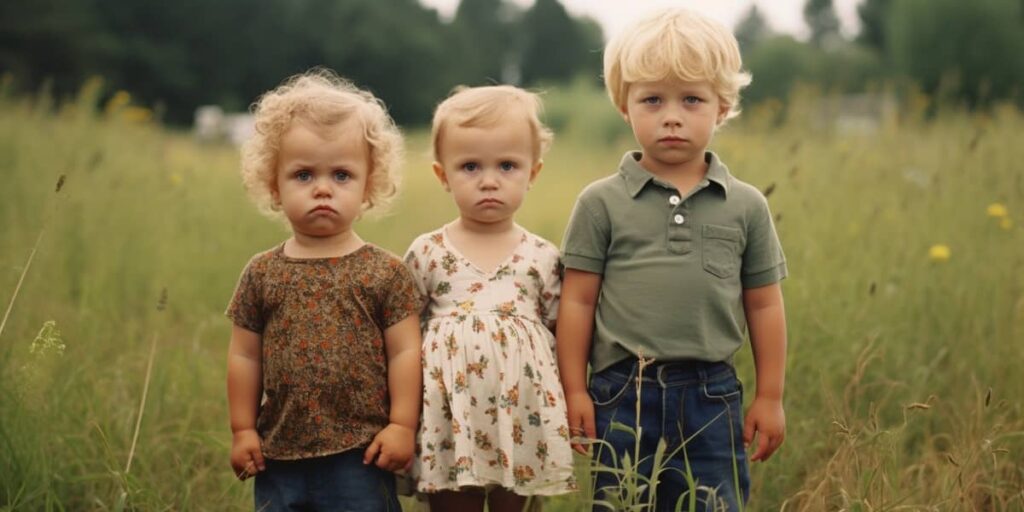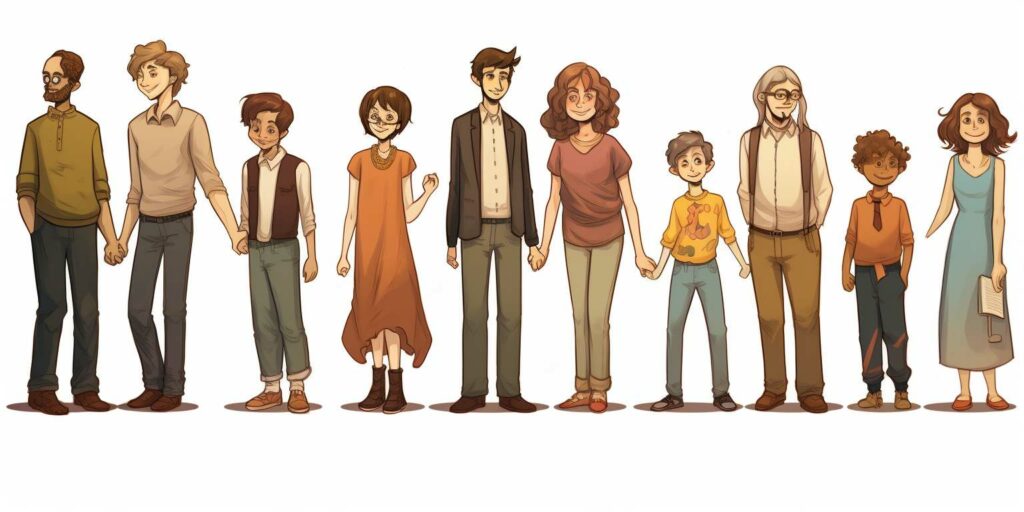Ever wonder why you and your siblings, although raised in the same environment by the same parents, have such different personalities? The answer may lie in birth order theory. This psychological concept suggests that a person’s rank within their family – whether they’re firstborn, middle child, youngest or an only child – can significantly influence their personality and behavior.
I’ve always been fascinated by this theory since it seems to explain so much about personal dynamics. As a firstborn myself, I’m often seen as responsible and achievement-oriented; traits commonly associated with eldest children according to birth order theorists. But is there solid evidence backing these claims? Or is it all just anecdotal conjecture?
Let’s delve into the nitty-gritty of birth order theory together. Through exploring its origins, scrutinizing key studies and considering potential flaws in this concept, we’ll gain a deeper understanding of how our place within our sibling hierarchy might shape us more than we ever realized.
Understanding Birth Order Theory
Ever wonder why your older sibling seems so responsible while the youngest is quite the daredevil? That’s where birth order theory comes into play. Essentially, it’s the concept that our personality traits are heavily influenced by our position in our family line-up.
The crux of this theory is based on observations and research carried out over many years. Alfred Adler, a renowned psychologist, was one of the earliest proponents of this theory. He proposed that first-borns often tend to be responsible and serious because they’re usually given responsibility at an early age.
Let’s dive deeper into Adler’s propositions:
- Firstborns: They’re typically perceived as leaders, often taking on parental roles within the family. This can make them more independent but also more prone to stress.
- Middle children: A bit of a mystery box! They may develop traits to differentiate themselves from their older siblings and are often very sociable.
- Youngest children: Often seen as spoiled or indulged, these kids enjoy more freedom than their elder siblings which can lead to them being risk-takers or rebels.
It’s important to note though that these patterns aren’t set in stone – families vary hugely and factors like gender, age gaps and socioeconomic status also come into play when determining personality traits.
In recent years there have been numerous studies around birth order theory presenting various findings:
| Study | Findings |
|---|---|
| University of Illinois (2015) | Found negligible links between birth order and personality traits |
| University of Leipzig (2015) | Discovered minor differences in self-reported conscientiousness between firstborns and later-borns |
While these theories continue stirring conversations among psychologists worldwide, it’s key for us not to pigeonhole ourselves or others based purely on our place in the family tree. After all, we’re complex creatures molded by a myriad of factors beyond just whether we were born first or last in our families.
The Role of First-Born in Birth Order Theory
Diving right into the birth order theory, let’s focus on first-borns. They’re often considered the “trailblazers” in a family. Traditionally, they’re seen as natural leaders and perfectionists. According to Dr. Kevin Leman, author of “The Birth Order Book,” first-born children are typically reliable, conscientious, and structured.
Unfolding some numbers here – a popular study by Feinberg School of Medicine at Northwestern University found that first-borns had an IQ 1.5 points higher than their following siblings on average. While this may not seem significant, it does demonstrate a trend backed up by other studies.
| Study | Average IQ difference |
|---|---|
| Feinberg School of Medicine (Northwestern University) | 1.5 points higher |
It’s also interesting to note that over half of all US Presidents were first-borns! This further emphasizes their leadership qualities.
- John F Kennedy
- George W Bush
- Barack Obama
But it’s not just about leadership roles or intelligence; they also tend to bear more responsibility from an early age compared to their younger siblings. Parents naturally rely on them for help as new siblings arrive, which can lead to maturity at an early age.
However, there are downsides too – they can be hard on themselves and struggle with high expectations from parents and themselves. It’s crucial we understand these traits aren’t set in stone; every individual is unique regardless of birth order.
In wrapping up this section about first borns’ role in birth order theory, I’d say they’re often seen as mini-adults within families due to their mature approach towards responsibilities and challenges.
Middle Child Syndrome: A Look into Birth Order Theory
Ever found yourself sandwiched between an overachieving older sibling and a pampered younger one? I certainly have. It’s the classic scenario of the “middle child syndrome”, a term coined in the realm of birth order theory. This concept suggests that your personality, behavior, and even life path might be influenced by your position in the family line up.
Let me take you on a journey through this intriguing theory. Alfred Adler, an Austrian psychotherapist, was one of the earliest proponents of birth order theory. He believed that middle children often feel left out or overlooked, leading to feelings of insignificance. They’re not showered with attention like their younger siblings nor entrusted with responsibilities as their elder ones are.
But it’s not all gloomy for us middle kids! We often develop excellent negotiation skills because we’re forever mediating between our siblings. Plus, we tend to be more independent and innovative due to our need to stand out from our siblings’ shadows.
While there’s been plenty of debate around this topic – after all, not every middle child feels neglected – some interesting statistics underline its relevance:
- According to data from The Guardian (2018), 52% of US Presidents were middle children.
- The Business Insider (2017) reported that 80% of CEOs are either firstborns or only children; leaving just 20% who are middle-borns or last-borns.
These figures suggest that while many middle children do rise above adversity, there remains a discrepancy compared to other birth orders when it comes to leadership roles.
| Source | Percentage (%) |
|---|---|
| US Presidents(Middle Children) | 52 |
| CEOs (Firstborns/Only Children) | 80 |
Birth order theory is fascinating but remember it’s just one piece in the complex puzzle that makes us who we are. Factors such as family dynamics, socioeconomic status, and individual temperament also play crucial roles. As a middle child myself, I’d say we’re pretty great – but then again, I might be biased!
Youngest Child Traits According to Birth Order Theory
Ever found yourself wondering why your youngest sibling is so free-spirited? Well, it’s not a coincidence. The birth order theory believes that the order in which you’re born has a significant impact on your personality traits. And for the youngest child, there are certain distinct characteristics they tend to display.
One of these traits is being outgoing. As the baby of the family, they’re often exposed to more social situations earlier and more frequently than their older siblings. This exposure helps them become comfortable in social settings, leading them to be more extroverted.
Another common trait among youngest children is creativity. They often have more freedom and less pressure compared to their older siblings, allowing them to explore different ideas and interests freely. This exploration can foster an environment for creative thinking and innovative problem-solving.
Youngest children also tend to be more relaxed or easy-going compared to their elders. With parents who’ve already navigated child-rearing with the elder siblings, there’s usually less pressure placed on the last-borns. They grow up in a slightly relaxed atmosphere which often shapes them into laid-back individuals.
Lastly, but certainly not least, youngest children are known for being charming. Being the baby of the family means they need to carve out their own space amidst pre-existing familial roles – charm becomes a powerful tool here! It helps them gain attention and make their mark amongst older siblings.
Here’s a summary:
- Outgoing
- Creative
- Relaxed
- Charming
Remember though: while research suggests these traits are typical among last-borns, every individual is unique! Not all youngest children will fit perfectly into this mold – life experiences and parental influence play crucial roles too.
Only Children and the Birth Order Theory
Being an only child isn’t as straightforward as it may seem when you look through the lens of birth order theory. I’ve always found this particular facet of the theory to be particularly intriguing due to its unique characteristics and implications.
Let’s start with a basic understanding that only children have no siblings to compete or cooperate with, which dramatically changes their developmental environment. According to research by Falbo and Polit (1986), only children are often over-represented in leadership roles, indicating they might develop traits typically associated with firstborns.
| Study | Result |
|---|---|
| Falbo & Polit (1986) | Only children are over-represented in leadership roles |
Yet, it’s not just about being “pseudo-firstborns”. Psychiatrist Alfred Adler, who developed the birth order theory, suggested that without siblings, only children could become excessively spoiled due to undivided parental attention. However, modern studies such as one done by Doug Downey at Ohio State University debunk these stereotypes,
| Study | Result |
|---|---|
| Doug Downey (Ohio State University) | No significant differences between only children and those with siblings in terms of personality traits |
While there’s still much debate surrounding how being an only child affects one’s personality and behavior under birth order theory, I believe it’s safe to say that each individual’s experience differs considerably based on countless factors including parenting styles, socio-economic status or cultural background. So let’s keep exploring this fascinating topic together!
Critiques and Counterarguments Against Birth Order Theory
While birth order theory has its fair share of proponents, it’s not without its critics. Some experts argue that the theory oversimplifies the nuances of family dynamics and individual development. They believe there are far more factors shaping personality than merely our position in the sibling lineup.
One major critique is the lack of consistency in research findings. For instance, a number of studies have found no significant relationship between birth order and personality traits such as extraversion or neuroticism. Others have even contradicted Alfred Adler’s claims, suggesting that first-borns aren’t necessarily more achievement-oriented or responsible than their younger siblings.
| Study | Findings |
|---|---|
| Jefferson et al., 2013 | No significant relationship between birth order and extraversion |
| Sulloway, 1996 | First-borns not proven to be more responsible |
A further point of contention lies in the potential for confounding variables in birth order research. Factors like socioeconomic status, parental age at time of childbirth, family size – they all can significantly influence a child’s upbringing and subsequent personality development. Without controlling for these elements in their studies, researchers risk attributing effects to birth order that might actually stem from other sources.
Even within families, variance exists which may undermine the basis for generalization proposed by birth order theory. Personalities can shift dramatically based on unique circumstances like death of a sibling or parent-child relationships’ quality over time.
Lastly, there’s an argument against the overemphasis on competition among siblings as a primary driver for character formation posited by Adler’s theory. Critics assert that cooperation and shared experiences among siblings can also play pivotal roles in defining one’s character traits.
- Oversimplification of complex familial dynamics.
- Inconsistent research findings.
- Potential confounding variables.
- Intra-family variations.
- Underestimation of cooperation among siblings.
These are some of the key counterarguments and critiques against birth order theory, challenging its validity and reminding us that personality development is a complex process influenced by myriad factors.
Practical Implications of Birth Order Theory in Everyday Life
You’ve probably heard about birth order theory before. Essentially, it’s the idea that your position in your family—whether you’re the firstborn, a middle child, an only child, or the baby of the family—can significantly influence your personality and behavior. But have you ever stopped to consider how this concept might play out in everyday life? Let’s dive into some practical implications.
First off, understanding birth order theory can aid parents in recognizing why their children behave differently despite being raised under similar conditions. For instance, firstborns are often more conscientious and achievement-oriented than their siblings. They’re used to being the center of attention and may strive to maintain that status through high performance at school or work.
On the other hand, middle children frequently develop excellent negotiation skills since they’re used to “fighting” for their place within the family hierarchy. They may also be more social and cooperative because they’re constantly interacting with older and younger siblings.
As for last-borns? They tend to be outgoing risk-takers who thrive on attention from others. This could translate into charismatic leaders or creative visionaries later in life.
But what if we extend these insights beyond familial settings? Then we start seeing how birth order theory can impact our interpersonal relationships too. It could potentially explain why you gravitate towards certain types of people or struggle with specific relationship dynamics.
For example:
- Firstborns might find themselves drawn to other firstborns because they share similar driven attitudes.
- Middle children may excel in roles that require negotiation and compromise – say diplomacy or sales.
- Youngest kids’ knack for creativity could make them great artists, marketers, or entrepreneurs.
When it comes down to it though, remember that these aren’t hard-and-fast rules – just broad trends observed over time. Life experiences can certainly reshape our personalities too!
Finally yet importantly, birth order theory could also have implications in the professional world. Employers might use this information to better understand their employees’ strengths and weaknesses, which could help them build more effective teams.
So there you have it – birth order theory isn’t simply an intriguing concept to ponder over coffee. It’s a practical tool that can offer valuable insights into how we interact with the world around us.
Concluding Thoughts on Birth Order Theory
I’ve come to end of my exploration into the intriguing world of birth order theory. It’s been quite a journey, examining how this concept shapes dynamics within families and impacts individual personality development.
While there are certainly some patterns that suggest birth order can influence our characters and life choices, it’s crucial not to overlook the myriad other factors at play. Genetics, parenting style, socio-economic status, gender – all these elements also have a significant role in molding us as individuals.
Here’s a quick recap of what I’ve covered on birth order theory:
- Firstborns often display traits like leadership and responsibility.
- Middle children typically show characteristics of being social butterflies and peacekeepers.
- Youngest children tend to be risk-takers and outgoing.
- Only children might exhibit qualities similar to firstborns but amplified due to their solo status.
Regardless of where we fall in our family tree though, it’s essential not to let theories box us in or dictate our destinies. We’re wonderfully complex beings with the power to learn, grow, and evolve beyond any preconceived limitations.
In conclusion: While birth order theory offers insightful perspectives about familial roles and personality tendencies based on sibling hierarchy, it doesn’t hold an absolute say over who we become. Our unique journeys shape us more than anything else. So whether you’re a firstborn leader, a middle child negotiator or the rebellious youngest one—embrace your strengths! After all they make up just part of what makes you uniquely you.



